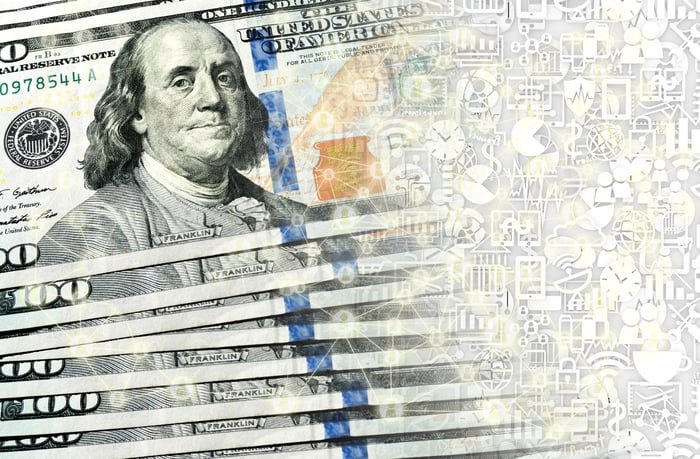Roughly nine years ago, bitcoin made its presence known and introduced the world to a new type of peer-to-peer payment platform known as blockchain. Rather than conducting transactions on traditional banking networks, blockchain sought to simplify transactions to include just a sender and receiver of funds. Since then, blockchain innovation and partnerships have flourished.
Blockchain innovation spurs partnerships
Blockchain itself aims to resolve three perceived issues with today's financial system. First, it's a decentralized ledger that stores transaction data in hard drives and servers all over the world. Not having a central data hub ensures that no single entity, including hackers, can ever gain control of a network.

Image source: Getty Images.
Second, as noted, blockchain eliminates the need for banks to act as intermediaries during transactions. That means fewer fees that need to be disbursed, and it potentially could reduce transaction costs.
Finally, proofing of transactions is ongoing 24 hours a day, seven days a week with blockchain, which could dramatically reduce the time it takes to validate and settle a payment. Whereas today's banking system could take up to five business days to clear a cross-border payment, blockchain might offer the potential for clearing to occur in real time, or in as little as a few seconds.
As you might expect, some of the biggest cryptocurrencies by market cap have been notching some serious blockchain partnerships. The Enterprise Ethereum Alliance, which has approximately 200 members worldwide, consists of organizations and brand-name businesses from a variety of industries that are testing a version of Ethereum's blockchain, which incorporates smart contracts -- protocols that verify, facilitate, or enforce the negotiation of a contract -- that give enterprises the ability to customize legally binding digital contracts to fit their needs.
Ripple has also partnered with a growing number of brand-name businesses. Ripple's blockchain is arguably one of the fastest around, with a touted ability to process up to 1,500 transactions per second, and all for a fraction of a cent in fees. Ripple has five brand-name partners already and has been seemingly adding new financial institutions to its RippleNet with regularity.

Image source: Getty Images.
This little-known cryptocurrency is making a name for itself in 2018
However, once in a while a little-known cryptocurrency emerges from the shadows of the big boys (bitcoin, Ethereum, and Ripple) and lands an elephant of a partner. This week, that's exactly what happened to VeChain, which is being rebranded to "VeChain Thor."
VeChain Thor is a blockchain-as-a-service company that's possibly the best-performing big cryptocurrency ($1 billion market cap, or higher) in 2018. VeChain tokens have soared 146% since the year began, through Feb. 26. Until earlier this week, two catalysts had been primarily responsible for its impressive gains.
First, VeChain Thor partnered with DNV GL, a global provider of assurance services. As a blockchain service designed with transparency in mind, VeChain's platform creates a means to monitor supply chains in real-time. What's more, it can utilize Internet of Things technology embedded in products to allow wholesalers and retailers to see how products performed in terms of quality control.
Second, VeChain Thor became the first cryptocurrency to pass the Cryptocurrency Disaster Recovery Plan (CDRP), according to PwC. The CDRP essentially examined a number of threats to VeChain Thor's blockchain -- based on likelihood and severity -- and determined that the company had sufficient procedures in place to protect cryptocurrency assets. In other words, VeChain Thor's network appears secure.

BMW M5. Image source: BMW.
VeChain Thor bags an elephant
The newest feather in the cap for the VeChain Foundation was the announcement on Monday, via a YouTube-posted presentation, that it was indeed partnered with German auto giant BMW (BMWYY -0.87%). Though not too many specifics were given, as the presentation primarily focused on VeChain's rebranding as VeChain Thor, which will now operate with two unique virtual currencies, there are two obvious benefits of blockchain for BMW.
For starters, the transparency of blockchain should allow BMW to more accurately track its parts inventory and reduce inefficiencies. With transparent supply chains, problems can be pinpointed a lot more quickly than with traditional paper trails.
Second, BMW can use the added transparency of blockchain to its advantage. Let's not forget that Volkswagen (VWAGY -0.33%) admitted in 2015 that VW diesel-engine cars sold in America had software designed to trick emissions tests into producing better results. Similarly, both Ford and General Motors suffered from a parade of automotive safety recalls in 2014. And then, just last year, Japanese airbag maker Takata filed for bankruptcy protection following a huge number of recalls. The auto industry is recently rife with scandal, so BMW's ability to allow consumers an intricate look at its parts and vehicle history, as well as quality testing, with the assistance of VeChain Thor's blockchain could give it a serious one-up on its competition.

Image source: Getty Images.
A few things to keep in mind
Of course, BMW isn't the only automaker to get its feet wet with blockchain. Volkswagen Chief Digital Officer Johann Jungworth joined the supervisory board of the IOTA Foundation in January. Rumors that IOTA and Volkswagen could announce a formal collaboration some point soon have been swirling ever since. In essence, there's likely to be competition in the automotive blockchain space.
While this is really exciting news for blockchain enthusiasts and VeChain Thor token holders, it's also important to understand that no brand-name companies have broadly adopted blockchain technology as of yet. This doesn't in any way mean that VeChain Thor isn't doing something amazing by offering its blockchain platform to BMW as a means to boost transparency and reduce supply chain issues, so much as to suggest that BMW will likely take this integration slowly, as most companies have.
This is going to be a pivotal year for blockchain. Can it move beyond just small-scale and proof-of-concept projects and into the mainstream? The answer to this question will likely determine how well or poorly cryptocurrencies like VeChain Thor perform in the months and years that lie ahead.
